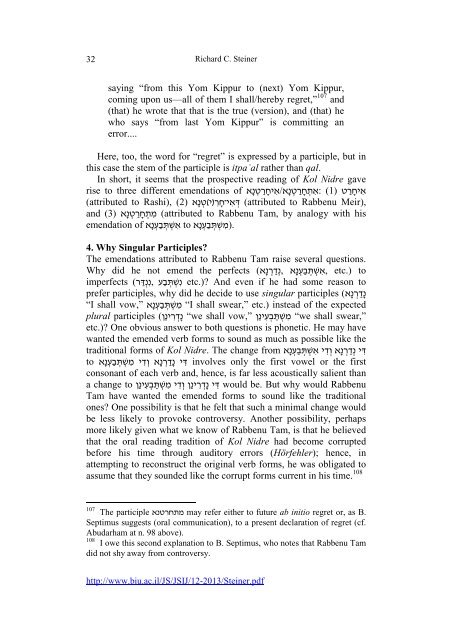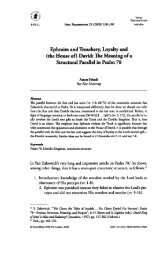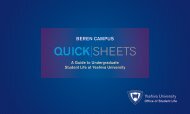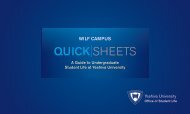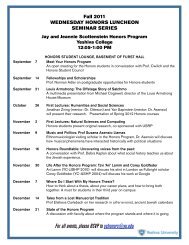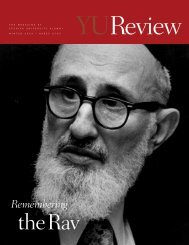Richard Steiner, Kol Nidre - Yeshiva University Blogs
Richard Steiner, Kol Nidre - Yeshiva University Blogs
Richard Steiner, Kol Nidre - Yeshiva University Blogs
You also want an ePaper? Increase the reach of your titles
YUMPU automatically turns print PDFs into web optimized ePapers that Google loves.
32<strong>Richard</strong> C. <strong>Steiner</strong>saying “from this Yom Kippur to (next) Yom Kippur,coming upon us—all of them I shall/hereby regret,” 107 and(that) he wrote that that is the true (version), and (that) hewho says “from last Yom Kippur” is committing anerror....Here, too, the word for “regret” is expressed by a participle, but inthis case the stem of the participle is itpaʿal rather than qal.In short, it seems that the prospective reading of <strong>Kol</strong> <strong>Nidre</strong> gaveאִ יחָ רַ ט (1) :אִ תְ חָ רַ טְ נָא/אִ יחָ רַ טְ נָא rise to three different emendations ofדְּ אִ י־חָ רִ (י)מִ תְ חָ רַ.(מִ שְׁ תְּ בַ עְ נָא to אִ שְׁ תְּ בַ עְ נָא emendation of(attributed to Rashi), (2) טְ נָא (attributed to Rabbenu Meir),and (3) טְ נָא (attributed to Rabbenu Tam, by analogy with his4. Why Singular Participles?The emendations attributed to Rabbenu Tam raise several questions.Why did he not emend the perfects דַ רְ נָא) ,נְ , etc.) toimperfects נִ שְׁ תְּ בַ ע ,נִ נְ דַּ ר) etc.)? And even if he had some reason toנָדַ רְ נָא) prefer participles, why did he decide to use singular participles“I shall vow,” מִ שְׁ תְּ בַ עְ נָא “I shall swear,” etc.) instead of the expectedplural participles נָדְ רִ ינַן) “we shall vow,” מִ שְׁ תַּ בְ עִ ינַן “we shall swear,”etc.)? One obvious answer to both questions is phonetic. He may havewanted the emended verb forms to sound as much as possible like thetraditional forms of <strong>Kol</strong> <strong>Nidre</strong>. The change fromto דִּ י נָדַ רְ נָא וְ דִ י מִ שְׁ תְּ בַ עְ נָא involves only the first vowel or the firstconsonant of each verb and, hence, is far less acoustically salient thana change to דִּ י נָדְ רִ ינַן וְ דִ י מִ שְׁ תַּ בְ עִ ינַן would be. But why would RabbenuTam have wanted the emended forms to sound like the traditionalones? One possibility is that he felt that such a minimal change wouldbe less likely to provoke controversy. Another possibility, perhapsmore likely given what we know of Rabbenu Tam, is that he believedthat the oral reading tradition of <strong>Kol</strong> <strong>Nidre</strong> had become corruptedbefore his time through auditory errors (Hörfehler); hence, inattempting to reconstruct the original verb forms, he was obligated toassume that they sounded like the corrupt forms current in his time. 108אִ שְׁ תְּ בַ עְ נָ אדִּ י נְ דַ רְ נָא וְ דִ י אִ שְׁ תְּ בַ עְ נָא107The participle מתחרטנא may refer either to future ab initio regret or, as B.Septimus suggests (oral communication), to a present declaration of regret (cf.Abudarham at n. 98 above).108I owe this second explanation to B. Septimus, who notes that Rabbenu Tamdid not shy away from controversy.http://www.biu.ac.il/JS/JSIJ/12-2013/<strong>Steiner</strong>.pdf


